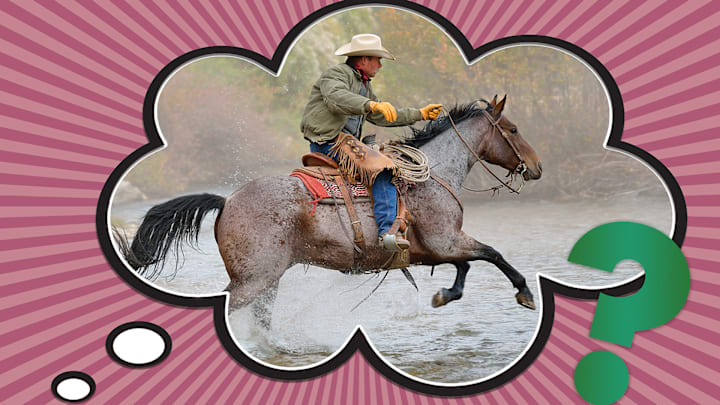When you think of a stereotypical cowboy, there are a couple of images that’ll likely come to mind: A horse, some cows, and a comically large hat, to name a few. Now, picture that cowboy gearing up to gallop off into the sunset—you can practically hear him bellowing a hearty yee-haw as he swirls his lasso in the air.
Even though it’s a classic cowboy trope, you have to wonder: Did cowboys actually say that popular phrase?
The Origins of Yee-Haw
The New Oxford American Dictionary defines yee-haw as “an expression of enthusiasm, typically associated with cowboys or rural inhabitants of the southern U.S.” But how did it get there?

Some folks trace yee-haw back to old horse commands, specifically gee (“go right”) and haw (“go left”). These were common calls for guiding oxen and horses, and they’ve been used as far back as the 1800s. Over time, those directional commands may have morphed into more expressive yells, like gee-haw, and eventually yee-haw.
By the early 1900s, yee-haw (and other exuberant exclamations like yippee or yahoo) was cropping up in literature and everyday speech, especially in Western-themed books and films. The media loved it, and it stuck around for quite some time. But as it turns out, the phrase was more common in pop culture than it was out in the plains.
Did Cowboys Actually Say Yee-Haw?
The image of a cowboy yelling yee-haw was more of a Hollywood trope than a historical truth. Real-life cowboys, especially those from the late-1800s cattle drive era, were far more likely to say things like whoa, git along, or come by.
It’s also important to note that a huge portion of the cowboy workforce wasn’t white. Up to one in three cowboys was Black, Mexican, or Indigenous—all groups whose expressions and languages were rarely represented in old Western films. Many spoke Spanish or were influenced by Mexican vaqueros and used terms like arriba, vámonos, or dale.
Despite its theatricality, yee-haw endures. You probably won’t find any modern equestrians saying it (just like you won’t hear giddy-up around most barns, either). But you will hear yee-haw in all sorts of spirited situations, from little kids on a park carousel to Instagram cowgirls posing in pink fringe and snakeskin boots. It’s been memed, reclaimed, and reimagined. Sometimes, a good old-fashioned yee-haw just hits the spot, cowboy or not.
Get Answers to More Big Questions:
